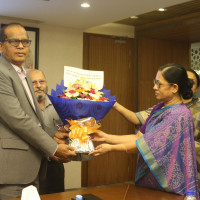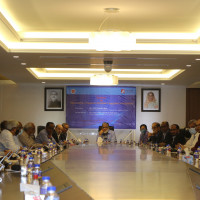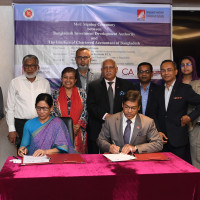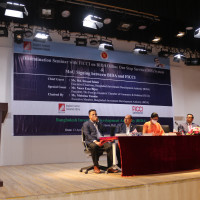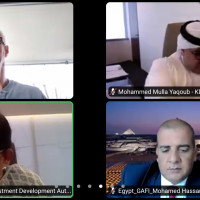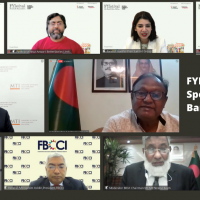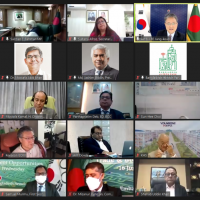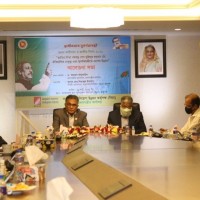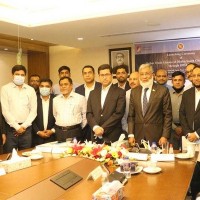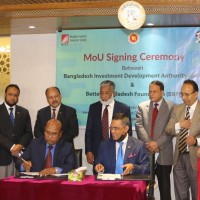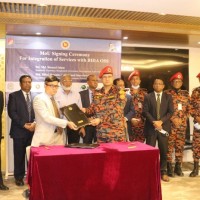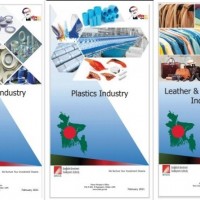Chief Adviser's Office
Investment News
High-powered NCMID meets to speed up Doing Business reforms
Jul 08, 2020
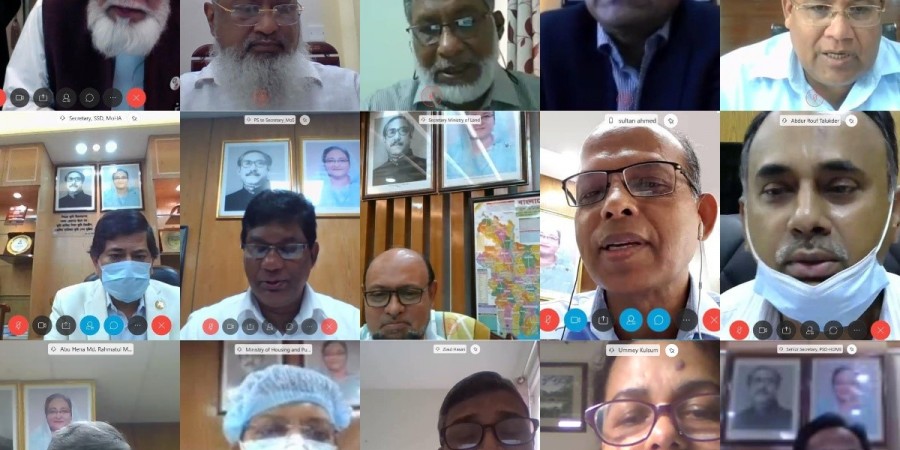
The 5th meeting of the National Committee for Monitoring Implementation of Doing Business Reforms (NCMID) has been held though a video conference.
The Hon. Prime Minister’s Private Industry and Investment Adviser Salman Fazlur Rahman MP joined the high-level meeting chaired by Cabinet Secretary Khandker Anwarul Islam on Tuesday.
The 15-member NCMID is comprised of top representatives of ministries, departments and agencies responsible for the implementation of reforms to improve Bangladesh’s ranking on World Bank’s Ease of Doing Business index.
During the meeting, a presentation was delivered on behalf of BIDA, which highlighted the reforms initiatives achieved under Ease of Doing Business, planned future reforms and the service integration status of BIDA’s One Stop Service (OSS).
“Ease of Doing Business is crucial for both new and existing investment. To achieve the targets set by our Honourable Prime Minister Sheikh Hasina, we must be focused on investment,” said HPM’s Adviser Salman Fazlur Rahman MP.
He urged then NCMID members to set individual targets for subordinate agencies to ensure speedy implementation of reforms identified in BIDA’s Doing Business Action Plan.
The Ease of Doing Business had 10 indicators, to which another indicator -- ‘Contracting with the Government’ -- has been added, said NCMID Chairman Cabinet Secretary Khandker Anwarul Islam. “We have discussed Doing Business requirements in Cabinet meetings. For all of us, it is a fundamental job and by setting up effective coordination we must ensure the progress of reforms,” he told the meeting.
The Honourable Prime Minister has set the target for achieving double-digit ranking in the World Bank’s Ease of Doing Business by 2021, said BIDA Executive Chairman Md. Sirazul Islam. “For that we must retain and continue achieved reforms. The speed of integrating G2B services with BIDA’s One Stop Service must be accelerated, as digital services for their effectiveness and efficiency are key drivers for improving the country’s business climate.”
The reforms carried out within the specific parameters of Doing Business will stimulate broader reforms for Bangladesh's business environment, he added. Bangladesh has reported a series of improvements in seven indicators for the World Bank’s upcoming Doing Business 2021 report.
Committee members and other participants
Senior Secretaries and secretaries representing the Legislative & Parliamentary Affairs Division, the Ministry of Housing and Public Works (MoHPW), the Security Services Division (SSD), Public Security Division (PSD), Local Government Division (LGD), Ministry of Shipping (MoS), Power Division, Ministry of Land (MoL), Ministry of Environment and Forests (MoEF), Ministry of Commerce (MoC), the Law and Justice Division were present in the meeting.
Senior secretaries from the Ministry of Public Administration (MoPA), the Prime Minister’s Office (PMO) were also present. The Executive Chairman of Bangladesh Investment Development Authority (BIDA), which is the government’s lead agency for coordinating EoDB reforms, also joined the meeting.
The Chairman of the National Board of Revenue also attended the meeting besides senior officials of the Bangladesh Bank. Representatives of the International Finance Corporation (IFC), BIDA’s technical assistance partner in Doing Business and other areas, were also present in the meeting.
Key highlights: the government’s ongoing efforts
Cabinet Secretary Khandker Anwarul Islam, who moderated the session, sought reforms updates from the committee members and provided crucial instructions.
The Bangladesh Bank is working to enact The Secured Transaction (Movable Assets) Act in line with Doing Business criteria and for the improvement of overall business climate, said Md. Ashadul Islam, Senior Secretary, Financial Institutions Division, Ministry of Finance. If implemented, the reform will improve Bangladesh’s score for movable collateral registry under Access to Credit.
The government is also working to amend the Bankruptcy Act, he said, addressing measures under Resolving Insolvency. All line agencies agreed to work together to amend relevant laws to establish an insolvency regime in the country.
Automation required for e-trade licence will be carried out by city corporations in Dhaka and Chattogram, said Mr. Helal Uddin Ahmed, Senior Secretary, Local Government Division. The reform will positively impact the indicator for Starting a Business.
Fast-tracking the issuance of permit for low-risk green category buildings (warehouse) was discussed with the Department of Environment, which is one of the requirement under Dealing with Construction Permits.
We are working to ensure effective generation and distribution of power,” said Dr. Sultan Ahmed, Secretary, Power Division, commenting on Getting Electricity. The System Average Interruption Duration Index (SAIDI)/System Average Interruption Frequency Index (SAIFI) targets will be met through the implementation of Supervisory Control and Data Acquisition (SCADA) for monitoring outages and restoration, he said.
Besides introducing faster and less costly measures for company-company land transfer, the Ministry of Land has taken initiatives to reduce cost for stamp duty and registration fee,” said Md. Muksodur Rahman Patwary, Secretary, and Ministry of Land. “We are exploring further scopes of reducing cost,” he said commenting on the Registering Property indicator.
Ministry of Shipping Secretary Mohammed Mezbah Uddin Chowdhury discussed plans for automation of export, import processes in line with best global practices to positively impact the country’s score under Trading Across Borders. National Board of Revenue Chairman Abu Hena Md. Rahmatul Muneem participated in the meeting and discussed measures under Paying Taxes.
Beyond the Doing Business index, the Cabinet Secretary also discussed the government’s ongoing measures to simplify processes for easier repatriation of profits and winding up of business. Emphasizing heavily on digitization, he proposed innovative measures for treasury payments and E-Khatiyan. He also urged that consumer-friendly measures be taken for distribution of natural gas.
The Cabinet Secretary urged the members to drive the reforms process by providing clear instructions to their subordinate agencies within this month and ensured the support of the Cabinet Division.
He also suggested that the NCMID should meet every two months and scheduled the next meeting at the end of August.
The government constituted the NCMID in September, 2017. The committee is tasked with monitoring the implementation progress of short, medium and long term reform recommendations while providing guidance to reform implementing agencies in addressing challenges among its other responsibilities.

